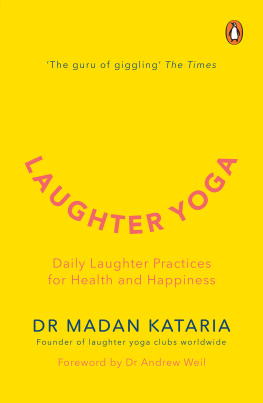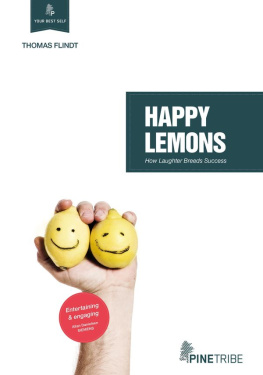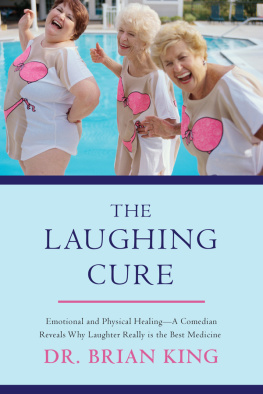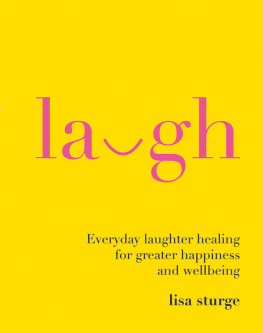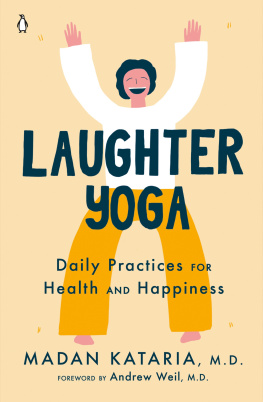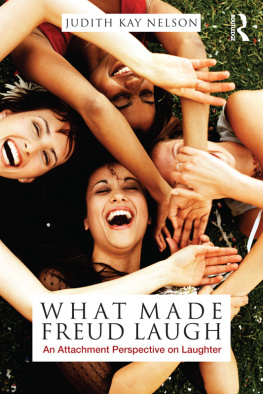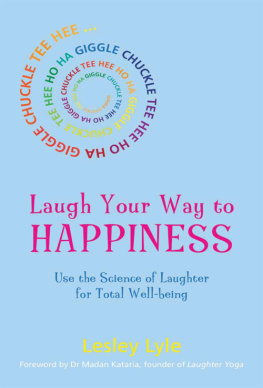Dr Madan Kataria, popularly known as the guru of giggling, is the founder of the laughter yoga movement that started in 1995. He is a sought-after keynote, motivational and inspirational speaker for corporations and organizations across the world. He has conducted seminars and workshops for UBS, Emirates Bank, IBM, Hewlett Packard, YPO (Young Presidents Association), SAS, Emirates Airlines, Volvo, GlaxoSmithKline Pharmaceuticals, the ministry of manpower, government of Singapore, the Parliament of Western Australia, and at the HRD Congress in Malaysia and the Dubai Wellbeing Show, among others. He has also featured on television and radio programmes across the world and is associated with an increasing number of medical research projects analysing the benefits of laughter.
Having retired from medical practice, Dr Kataria, who lives in Mumbai, devotes all his time to writing, teaching, coaching and training laughter leaders around the world in order to foster the spread of laughter clubs. He is also the creator of the immensely popular World Laughter Day celebrated on the first Sunday of May. For more information, you can visit www.laughteryoga.org.
Praise for Laughter Yoga
Laughter yoga is a perfect way to laugh and get exercise at the same time. It approaches laughter as a body exercise so its easy to laugh even if youre depressed or in a bad mood. Last year (2007), I highlighted laughter yoga on my TV program. Ive tried it, and it worksOprah Winfrey, Courier-Mail
Laughter connects you with people. Its almost impossible to maintain any kind of distance or any sense of social hierarchy when youre just howling with laughter. Laughter is a force for democracyJohn Cleese, actor and comedian, after visiting a laughter club in Mumbai during the filming of BBCs TV series The Human Face
I cant think of any other bodymind technique that has caught on this way. I told [the] American Senate Committee during a hearing about healthcare reform that laughter yoga could help lower American healthcare costsDr Andrew Weil, MD, a pioneer in the field of integrative medicine
Laughter yoga exemplifies a form of right-brain thinking that managers should promoteDaniel H. Pink, author
Dr Kataria is a physician who has transformed himself into the leader of an international movement that promotes laughter as a cure for just about any ailmentphysical, psychological, or spiritualNew Yorker
To all my students,
from whom I learnt more than what I taught
When you laugh, you change,
and when you change, the world changes
Foreword
The success of laughter yoga and scientific studies across the world have left no doubt that laughter has a powerful and profound effect on the human body and mind. Not only does it help to prevent illnesses but also contributes towards healing chronic diseasesboth physical and mental. Unfortunately, most people are unaware of the benefits of laughter if practised regularly. Until Dr Madan Kataria made laughter yoga popular both in India and globally, there was no reliable method of bringing more laughter into peoples lives. His breakthrough has allowed people to enjoy the many benefits of laughter without depending on external conditions and stimulation. It employs a remarkable exercise routine that combines yogic breathing with laughter, making it an ideal tool for complete bodymind wellness.
The method is straightforward. After brief physical and breathing exercises under the direction of a trained individual, people simulate laughter with vigorous repetitions of ha ha and ho ho. This fake laughter soon becomes real and contagious and may even continue for half an hour or more. Laughter increases the supply of oxygen to body tissues, boosts immunity, relieves pain, lowers stress and even helps protect against heart disease, diabetes, arthritis, migraine and cancer. It is a powerful technique: safe, easy and a lot of fun.
I cant think of any other bodymind technique that has caught on in this way. As laughter yoga gains popularity worldwide, the experience of thousands of people has stimulated research on the physiology and neurochemistry of laughter. I believe the movement is contributing significantly to public health.
Mere knowledge about laughter is not enough; you must practise it. It is the regular practice of unconditional laughter that brings about the desired physiological and biochemical changes that sustain a positive mental attitude. Training yourself to laugh regularly can also increase genuineness, compassion and sensitivity. It can make you more effective in dealing with others and with everyday situations. Over time, laughter yoga engenders qualities that can help you live a more sensible and virtuous life.
Tucson, Arizona (USA)
Dr Andrew Weil
Introduction
This book is a testament to my journey with laughter yoga which began in India in 1995 with only five people and has reached over 100 countries today. Not only has laughter changed my life dramatically, it has also touched the lives of many others around the world.
The way laughter yoga has been growing exponentially without any marketing or advertisement indicates how effective and powerful it is. Laughter yoga is not rocket scienceit is simple but profound. In fact, this unique concept has redefined laughter. Most people knew that laughter was the best medicine for the body and mind, but there was never a reliable delivery system. Laughter was simply the end result of some entertainment or amusement. Laughter yoga took it to an all-new level with a complete delivery system that allowed laughter to be prescribed as part of daily routine in order to realize all the health benefits it has to offer.
The concept of laughing for no reason stems from my roots. The youngest of eight children, I grew up in a small farming village, Mohrewala, in Punjab. It was here that I learnt about the relationship between simplicity and laughter. Most people in the village could laugh at the smallest of things. They did not need a reason to laugh or share jokes. For them, laughter was the most natural outcome of their uncomplicated daily lives. Meeting each other and dancing and singing at festivals, weddings and celebrations was reason enough to laugh and have fun. However, my perception of people and their ability to laugh underwent a major change while studying medicine in a big city.
Life was different in a metropolis. People were alone, constantly battling the stresses of modern life. Not having many reasons to laugh, they were always on the lookout for one. Their happiness and laughter were primarily conditional. Laughter was no longer natural; it was dependent on logic and reason. Also, people were self-conscious about laughing. Often, their laughter and humour turned negative as they ridiculed others.

